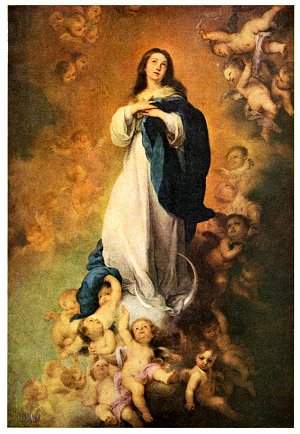Today is the Feast of the Assumption.

'The Immaculate Virgin, preserved free from all stain of original sin, when the course of her earthly life was finished, was taken up body and soul into heavenly glory, and exalted by the Lord as Queen over all things, so that she might be the more fully conformed to her Son, the Lord of lords and conqueror of sin and death.'
- Dogma proclaimed by the Catholic Church in 1950
Mary always brings to mind George Santayana. In the book Ameican Philosophy, Timothy Sprigge writes of this Spanish-born American philosopher: ‘In his [Santayana's] eventual philosophy, religion, at its deepest, was described as a system of symbols which enriched and deepened the experience of living, and which had a certain aptness as a way of adjusting to the world in its true character, but which entirely lacked literal truth. In the light of this Catholicism could be regarded as better than Protestantism, since its symbols were richer and more flexible, and more in tune with nature than Protestantism which, in an attempt to find literal truth, simply impoverished the symbols of Christianity without discarding its falsehoods. Thus Santayana thought that Catholicism provided a better way of life, more spiritually fulfilling for the saintly, and more enriching of natural life for the majority, than Protestantism and since to do this, and not to be true, is the function which reason ascribes to religion, it is to be judged the better type of Christianity. It was this attitude which evoked Bertrand Russell's quip that Santayana believes there is no God, and that Mary is his mother.’

- El Greco, The Assumption of the Virgin (1577)
And again: ‘[Santayana] developed one of the most perfectly worked out complex philosophical systems there is, and is a mine of subtle reasoning and distinctions and of insight into the major problems of philosophy. […] Upon the whole I would say that it is the most convincing, carefully worked out and comprehensive version of materialism or naturalism that there has been. At a time when so many philosophers are materialists, it is a pity that they do not attend to the one version of materialism which has really found a satisfactory way of dealing with spiritual values and with ethics, and of accounting for mind in a non-reductive way.’
Thursday, August 15, 2002
Subscribe to:
Post Comments (Atom)
0 comments:
Post a Comment